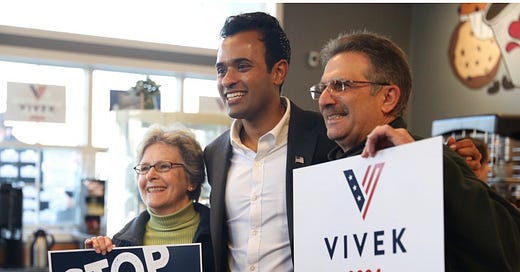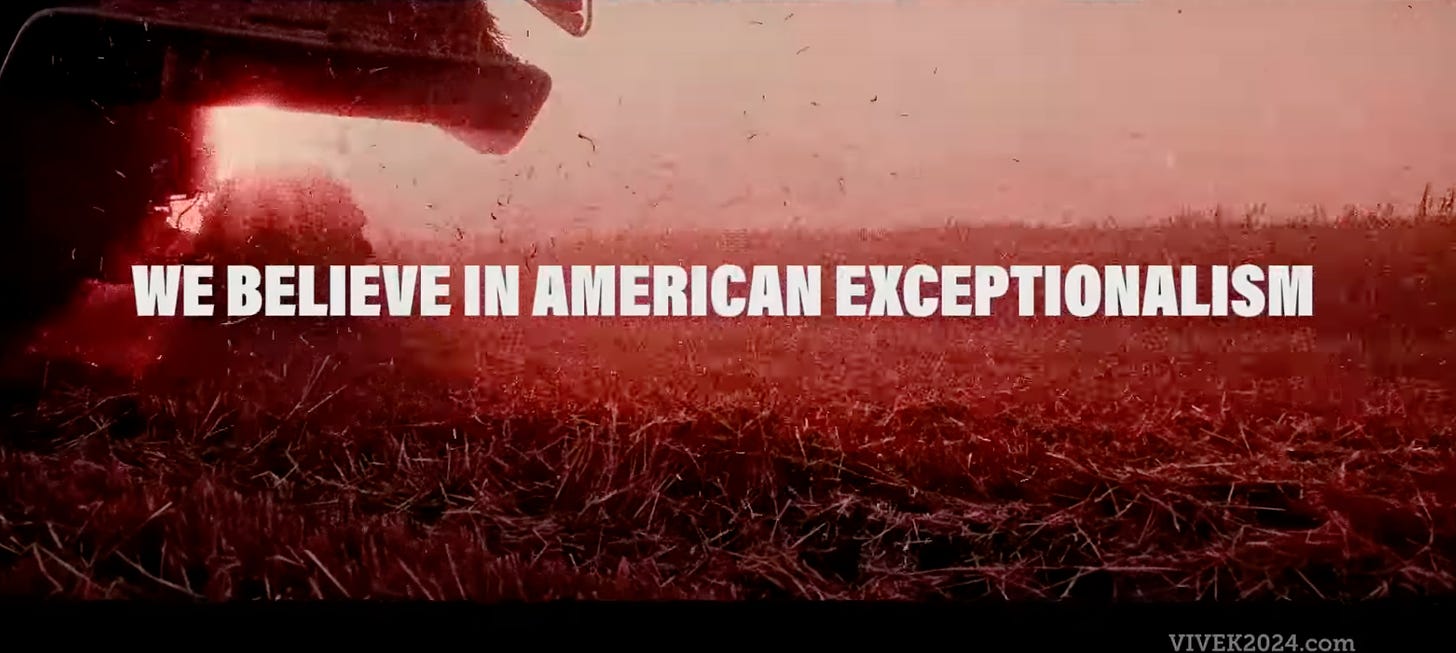A wealthy man who probably won't be President would like to tell you about "woke corporations"
Vivek Ramaswamy isn't going to win the Republican nomination in 2024, but it's worth understanding the faux-anti-corporate pitch he's making to conservative voters
Top notes:
This is an article about fake anti-corporate political cosplay and the politicians who pretend to care about working class issues. After you read it, maybe you’d enjoy an incredible (and not fake!) book about class and inequity from one of our best contemporary journalists? Well you’re in luck, Blood Money by Kathleen McLaughlin— about our neighbors who have to sell plasma to make ends meet— just came out today! It’s so good, seriously. It’ll take you from China to El Paso to Flint to Rexburg, Idaho and help build up your empathetic/good-and-mad muscles.
If you know me, you know that my mantra in responding to tragedies isn’t “look for the helpers” but “look for the organizers.” With that in mind, if you’re still following the mess in East Palestine, OH (which I hope you are!) I encourage you to check out (and support) the really cool on-the-ground work that the crew at River Valley Organizing are doing. As you’ll see below, I’m growing increasingly concerned that East Palestine is going to be simultaneously ignored by the Democratic Party/mainstream press and continue to be a bad faith conservative case célèbre. Sounds like a good moment to support folks on the ground who actually care about/for their neighbors.
As always, this operation is reader supported, so thanks so much to the paid subscriber crew. I’m not doing a pitch this week, as next week, I’m gonna do a mini pledge drive/looser odds and sods edition (it’s my birthday next Thursday and if you can’t get weird in your weekly newsletter on your birthday week, when can you?).
UPDATE: After initially sending this piece to subscribers, I received some feedback that I did not acknowledge ways that racial discrimination and White supremacy may have been at play in Ramaswamy’s family story (notable in particular because I’m a White writer). I thought it was a good critique (and made me think more about Ramaswamy’s choice to avoid that part of his bio). Some thoughts on that topic are now included in a new fourth paragraph that was not present in the version subscribers received in their inboxes.
Residents of the United States of America: You may not have heard, but Vivek Ramaswamy— the man better known as “the anti-woke CEO”— wants to be your President!
Since announcing his long-shot campaign for the Republican nomination last week, Ramaswamy has already hit the ground running with all the verve and energy that you’d expect from a hard-hustling Ivy League-educated life-long striver. He’s got a flashy video about how there’s a battle brewing for the soul of our country. He’s already put some miles on the New Hampshire coffee shop/Iowa Senior Center circuit. He’s even sanded his life story into a pithy, Obama-esque soundbite. Candidate Ramaswamy is an immigrant millennial who grew up in Ohio and overcame untold adversity (being “skinny,” having “nerdy glasses” and, of course, a “funny last name”) to become wildly wealthy in the pharmaceutical industry. Pretty inspiring stuff— did you know that in other, less exceptional countries the pathway to success is only open to kids with cool glasses?
The quick version of his story leaves out a few not-so-meritocratic details, naturally. The road to riches and fame for the son of two well-educated professionals from high-caste Indian backgrounds is at least slightly better paved than that trod by kids without those class and educational advantages (regardless of what kind of glasses they wear). But who amongst us hasn’t exaggerated the “adversity” dial on our biography when we’ve applied to a new job? Vivek Ramaswamy— he’s just like us!
Interestingly enough, Ramaswamy doesn’t talk about race when he names the laundry-list of adversity he has to overcome. The United States, of course, has never elected a South Asian President. While Ramaswamy’s pathway to success hasn’t been impacted by his childhood choice of eyewear, it’s no doubt true that his family has had to navigate a White/Christian supremacist country in ways that wouldn’t be the case for a meritocratic White Midwestern go-getter. That omission isn’t surprising given his audience (the disproportionally White Republican electorate) and his message (that race-based identity politics divides us) but it is notable.
So where we’re left (both with the story as its told and with what’s omitted) is a picture of Ramaswamy as an ambitious, capitalist true-believer who is willing to sell himself as a South Asian messenger for whatever cocktail of White identity politics and free market evangelism is currently popular with the Republican base. That’s not all that novel! He isn’t even the first declared Presidential candidate who literally fits that description. Justice for Nikki Haley, I guess!
What makes Ramaswamy interesting, though, is his specific pitch to conservative voters. It’ll take a bit of work to explain that argument, so bear with me. His pithy, focus-grouped biography notwithstanding, Ramaswamy is not the most succinct messenger in the world.1 His two campaign launch videos are between three and five minutes long, but I’ll do my best to summarize the main points here. If you don’t want to watch either of those videos, just imagine each of these arguments being illustrated with either a picture of a factory worker, a sweeping vista, or a scary conservative bogeyman (Black Lives Matter Protestors! Dr. Fauci! Greta Thurnburg) in the background:
We are in embroiled in a national identity crisis because we have replaced faith and family and traditional values with new religions: “Covidism” (!?) Climatism (!?) and Gender ideology (!?). Note: It is very important that these ideologies (as well as “wokism”) are exclusively referred to as “religions” and not as “ideas” or “three imaginary words that a conservative consultancy made up,” because doing so allows Ramaswamy to cast this moment as a holy War between those false idols and our more virtuous faith traditions (while the candidate himself is Hindu, he is obviously nodding to a different faith tradition when he tells viewers that “our” values are under attack).
We hunger to be a part of something bigger than ourselves, but feel disconnected from a shared national identity.
The woke Leftists and their partners-in-crime (more on that in a second) take advantage of this vacuum to divide us by race, gender, sexual orientation, etc., and to teach us to hate each other.
THIS HAS CAUSED A CULTURE OF FEAR!
Fortunately, our guy Vivek Ramaswamy is here to change that, by offering a new American dream founded on the following ideals:
MERIT!
ACCOUNTABILITY! (by which he means that there should be less Federal bureaucracy; to be honest I don’t totally understand this point. I mean, I get that conservatives hate bureaucracy, but Ramaswamy claims that the bureaucrats themselves are a cancer and have somehow metastasized to the private sector… like by getting jobs there? And making otherwise good business fail somehow? Sounds bad!).
THE BEST IDEAS WIN!
WE ALL BELIEVE THAT AMERICA IS GREAT!
If you’re really honest, those principles are what you and your neighbors already believe, and every other issue (he specifically cites “whether corporate tax rates should be higher or not” or “whether Ivermectin works,” the latter of which was just a delightful blast from the recent past) are “just details.”
We only feel that we’re divided because “the ruling party” has convinced us that we are so that they can amass more power.
We’ve obsessed way too much about our diversity and our differences, but were are actually more alike than we are different.
If we can revive our shared dream, nobody (“not a nation, not a corporation, not a virus”) is going to defeat us.
Ramaswamy throws a ton of ingredients in the pot there. A lot of it is a boilerplate, “Do you feel alone and divided from your fellow country-persons? Wouldn’t you prefer to feel united and part of something bigger than yourself?” pitch. You know, political messaging 101 stuff. But you’ll notice that there’s some interesting seasoning sprinkled in there: the idea that the divisions we’re experiencing didn’t just happen but were nefariously orchestrated by somebody (“the woke Left” perhaps, or maybe the “ruling political party”), the multiple offhand references to corporations, the idea that the private sector has somehow not just been hobbled but fully colonized by Federal bureaucrats. Those are clues that there’s a broader, more interesting (though not necessarily more coherent) Ramaswamian theory of the universe at play here.
Fortunately, you don’t have to dig very hard to find the less truncated version of Ramaswamy’s argument. He literally wrote a book about it— a 2021 best seller called Woke Inc.
I recently read Woke, Inc. (like its author, I am a hard-hustling son of the middle West who puts in the work). To give Ramaswamy credit where credit’s due, of the two campaign-preview-books I’ve read by potential 2024 Republican candidates so far, his is by far the most interesting. It doesn't just provide treacly autobiographical details. It's got ideas, damnit! It's very apparent that its author was a one-time college debater who once bragged about how he “considered himself a contrarian” who “just liked to argue”2 because oh buddy does our guy like to spin an argument.
The book is littered with clever debater’s tricks— the most common being Ramaswamy’s penchant for granting his opponents’ arguments. Are you a leftist who thinks that Uber are hypocrites for pledging a million dollars to racial justice charities at the same time they were bankrolling a referendum to permanently classify their drivers as low-paid, benefit-less “independent contractors?” Do you see through Nike’s support of Colin Kaepernick, given that its sneakers are still manufactured in sweatshops? Are you at least slightly skeptical of corporate commitments to identity-based equity concerns, particularly since the “woke” corporate moment emerged so quickly after a major social movement (Occupy Wall Street) that did offer a real, systemic critique of corporate power?
On all fronts, Ramaswamy agrees with you! Or at least he claims to! He’ll even admit that capitalism produces inequity, and that it has a tendency to colonize too many aspects of our lives. None of those are the arguments you’d expect from a Republican Presidential candidate who rails against “Covidism” and has proposed using U.S. troops to wage an actual ground war against Mexican drug cartels.3 Those all sound more like the kind of critiques you’d find in a work with a deep, nuanced racial and class analysis. If you loved Elite Capture, perhaps you’ll love Woke, Inc.? Maybe?
That’s all discursive sleight-of-hand, of course. Ramaswamy is no class traitor, even if he claims to be in his book’s introduction and even though the book is sprinkled with “would you believe these hypocrites?” anecdotes that are pitched as bombshells (like how, as a Goldman Sachs intern, Ramaswamy discovered that organization’s service days mostly involve wearing t-shirts, not planting trees and going to the bar).
Corporations are the enemy in Ramaswamy’s world, but not because they care too much about making money at the expense of human dignity and our environmental future. The contemporary corporation’s fatal flaw isn’t that they bust unions and poison our air and water. It’s that they worship at the alter of “stakeholder capitalism” rather than “shareholder capitalism.” By pursuing social justice— in either word or spurious action— they’ve lost their (greedy, money-making) souls.
You see— Ramaswamy assures us— the problem is that big businesses aren’t focused ENOUGH on just maximizing profits. Instead, they’re either trying to pretend to have moral values, or (in a smaller number of cases) actually attempting to live out moral values. Either way, Ramaswamy not only believes that all this is ham-fisted and hypocritical, but also (and this is the bow that ties all of his theories together) that it’s literally the devil’s engine that has made us feel divided and isolated from one another.
More specifically, Ramaswamy paints an alternate history of the past decade where— in the wake of Occupy Wall Street— an identity-obsessed “woke Left” accepted an arranged marriage with erstwhile “woke corporations” who felt they had much to gain (in consumer trust, employee recruitment from elite universities, etc.) from preaching the gospel of trans acceptance and Black Lives Matter. Together, the betrothed couple has been wildly successful in spreading their divisive message near and far. As a result, while we were once a united country (back in the halcyon days of the early aughts), “regular” Americans now feel guilty for their skin color, gender identity and vaccination status. We hide our true beliefs from our neighbors, lest we be canceled. And corporations want us to live in this way— fearful, defeated, divided— because for reasons Ramaswamy doesn’t quite explain, they now value the power they hold over our frail, frightened, “woke” psyches more than they value their quarterly earning reports.
It’s not an argument that holds up to any scrutiny, of course. The problem with Nike’s hypocrisy isn’t that they once supported a blacklisted activist Quarterback. It’s the sweatshops! Ramaswamy’s solution (which, on the economic side of the equation, is just a full return to Milton Friedman’s belief in corporations as craven profit-maximization machines) allows for the sweatshops, but not for the social justice gestures. That seems backwards!
There is a long and well-documented history of corporations co-opting leftist social movements to gain some degree of hip, youth-oriented credibility. If I am a part of any generation, it’s the one bonded together by our profoundly dog-eared copies of Naomi Klein’s No Logo. And Ramaswamy makes some nods to the fact that— to whatever degree there is an epidemic of performative corporate wokeness— marketing-based concerns are at play. That’s not the primary argument Ramaswamy makes though (because doing so would mean he would have to sympathize with the goal of the leftists that he disparages). Instead, he has to make up a non-existent conspiracy where the most radical activists are conspiring with JP Morgan to push wokeness just because doing so will bum out the rest of us. Pretty silly stuff from somebody who is being heralded as a brilliant new conservative voice!
It’s easy to see the rhetorical appeal, though. It purports to speak to Americans who know that the system is rigged, who rightfully don’t trust corporations and who have found themselves scared and confused by earnest social justice campaigns. It pretends to challenge corporate power, but reassures straight White Americans that the only truly evil thing that the corporations have done is to make them have to hear about ideas like “defunding the police” or “trusting that trans people aren’t all a bunch of nefarious liars trying to trick cis people.” It names our isolation and division from one another (rather than the root cause of those divisions) as the only problem to be solved for our country to be great again.
Since so many of us perennially feel alone and misunderstood (both for reasons unique to this economic and cultural moment and just because that’s what it means to be human), that’s actually a pretty compelling pitch. Or, at least Ramaswamy hopes it is, because if we agree with him on the problem, he knows exactly what we need: a charismatic unifier willing to tell us to get along (while telling corporations to get back to the business of making money by any non-woke means possible).
Vivek Ramaswamy wants Americans to believe that he is that uniter, of course. He will work very hard to pull off that trick. Likely, the odds won’t be in his favor: He’s too unknown, his style too wonky, his prose too academic. I could be wrong, though! More surprising things have happened in the Republican primary in my lifetime! But regardless of how well he performs in 2024, it is worth paying attention, because Ramaswamy’s brand of faux-anti-corporate outrage increasingly becomes the lingua franca for Republican politicians trying to hone up their populist bonafides.
This year has already seen Ron DeSantis trying on faux-anti-corporate themes (he’s recently held “Florida vs. Davos” events and, of course, loves trumpeting his war on the Disney Corporation). Trump’s original 2016 rise, of course, included half-hearted stabs at economic populism (particularly in regards to NAFTA and other “very unfair trade deals”). Just this past week, he positioned himself as the hero savior of East Palestine, OH (conservatives have recently shown an obsessive interest in that town: not, of course, because they’ve suddenly changed their tune on the need for railroad safety regulation, but because unforced errors by Biden and Pete Buttigieg have opened up a cynical “we care more about regular [White] working folks than the other team does” lane for Trump and Team MAGA).
The easy left/liberal response to all of this is to simply roll our eyes at its insincerity and toothlessness. That would be a mistake. Donald Trump has already taught us— over multiple election cycles— that when vast swaths of the (disproportionally White) voting population feel, justified or not, as if they’re powerless and that the strings are being pulled by some nefarious superstructure above them, faux-populism can smell and taste just like real populism.
The good news, though, is that Americans of all political stripes are so fed up with the role of corporations in their lives that even Republicans now have to acknowledge that particular elephant in the room.
That means we have a window of opportunity.
The trick (for those of us who crave justice for all) is to make sure that we’re making as compelling an argument to all Americans, not just those who already agree with us. It’s our job to argue that yes, corporations have too much power and are making our lives miserable. We deserve elected officials that stand up to those corporations in a real way— not fakers that scold them for saying Black Lives Matter, but not for dodging their income taxes. We must also acknowledge that many of us do feel divided and isolated from each other, but that the culprit for those divisions isn’t a a trans teen asking to have their personhood be respected. Rather, it’s bad faith conservative identity politics peddlers playing tired old divide and conquer tricks. They’re the ones taking us for suckers. They’re the ones peddling the the myth that our hearts aren’t big enough to care both about those whose life experiences are similar to ours as well as those who aren’t. They’re the ones telling the lie that we need smarter-than-thou saviors like Vivek Ramaswamy or his fellow Republican contenders to keep us safe from one another.
End notes:
Song of the week:
I kicked this off with a plug for Kathleen McLaughlin’s new book so that you’d have a good taste in your mouth before all this talk about faux-anti-corporate play-acting. Let’s finish off with another palette cleanser. This is one of my favorite songs from Lee Bains and the Glory Fires, who just might be the best band going right now at marrying a class/racial justice analysis with a deep love for the place they come from (in their case, that’s Birmingham). It’s called “Company Man.”
As always, you can find the collected song of the week playlist on Apple Music or Spotify.
As regular readers of this newsletter can attest: WHO AM I TO JUDGE?
For those of you who are not already aware, I am obligated to inform you that the Harvard Crimson profile of Ramaswamy from his undergraduate days focuses not just on his prowess as a debater but also his extremely well-developed hip hop alter ego “Da Vek” who “rapped libertarian prose with the upmost of ease.” Related: Was “Da Vek” inspired to run for President because he once auditioned to open for Busta Rhymes and was rejected? Possibly!
This is a real Ramaswamy campaign proposal that the candidate made during a recent interview with conservative media personality Charlie Kirk. Even though Kirk (not a guy known for his sober, grounded takes) tried to give Ramaswamy some cover (he said something to the effect of “obviously, we’d want to make sure that it was as humane and with as few casualties as possible”) Ramaswamy doubled down, assuring his interviewer that there would, indeed, be plenty of casualties.








"He offers rapper Eminem’s “Lose Yourself” as his life’s theme song. “I think that children should be forced to listen to it,” Ramaswamy says, “the edited version, of course.”"
now THAT's a policy proposal
Loved this analysis! This faux-anti-corporate rhetoric reminds me a lot of the way Republicans approached voters struggling in coal country in the late 2010s. It worked incredibly well at getting former Democrats across Appalachia to flip to the Republican party. But after almost a decade later: nothing's materially changed for the average voter in these places. Mines and plants continue to close, local unemployment continues to rise and healthcare remains out of reach (both economically and geographically) for most. The GOP's populism only exists in its campaigns, not in its governance. We just need to find a more accessible way to get this message to the average voter.